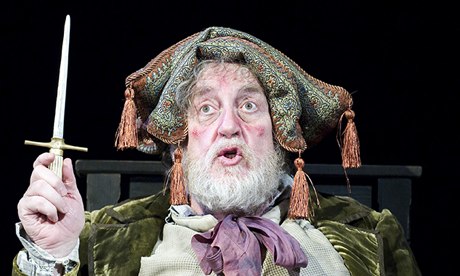How do writers come up with character names? Some raid their emails, some plunder their school days – and some take inspiration from Psycho. Stephen Poliakoff, Abi Morgan and more talk to David Jays about the hunt for the perfect moniker

Naming complications … Desmond Barrit as Falstaff – originally called Sir John Oldcastle. Photograph: Tristram Kenton for the Guardian
"I've never had a character called Jonathan," muses Stephen Poliakoff. "I don't like the name. But I've used Richard twice." The writer of nearly 50 plays and screenplays, including last year's Dancing on the Edge for the BBC, has come up with countless fictional names in the course of a career that has spanned almost five decades – from the disaffected waifs of his early plays to figures rubbing shoulders with 20th-century history in recent work. So how does he do it? "The name comes out of the character," he says. "I often see them, but just don't know what to call them. And if I give them the wrong name, I find I can't write – it's all to do with unlocking the stream of thought."
Theatrical names do a lot of heavy lifting: creating a world, setting a mood, sealing a time and place. A name can be destiny (nomen omen, in the Latin phrase), and British drama has a long tradition of grotesque naming to signal someone's characteristics. Penitent Brothel and Epicure Mammon in Jacobean comedy, Fopling Flutter and Lady Wishfort in the Restoration, wear their frailties and desires like branding, even if their authors gradually complicate the picture.
Although things may be more subtle in contemporary drama, playwrights do still seem to love the name game. "I'm completely obsessed by it," says James Graham, author of the National Theatre's 2012 hit political drama This House. "There is the potential for incredibly sexy, idiosyncratic names to do half the work for you." While working on the Old Vic's revival of Sweet Bird of Youth last year, he trawled through Tennessee Williams's early drafts and saw how the writer shifted from naturalism to symbolism. Phil Beam, the protagonist, gradually became Chance Wayne, perfect for a smalltown hero shooting for the stars. "It was brilliant to see the character gaining romance, poetry and symbolism," Graham says. "Chance Wayne is such a cool, matinee-idol name. Kim Cattrall [the production's star] said that as soon as he was named, his fate was sealed."
More
Theatrical names do a lot of heavy lifting: creating a world, setting a mood, sealing a time and place. A name can be destiny (nomen omen, in the Latin phrase), and British drama has a long tradition of grotesque naming to signal someone's characteristics. Penitent Brothel and Epicure Mammon in Jacobean comedy, Fopling Flutter and Lady Wishfort in the Restoration, wear their frailties and desires like branding, even if their authors gradually complicate the picture.
Although things may be more subtle in contemporary drama, playwrights do still seem to love the name game. "I'm completely obsessed by it," says James Graham, author of the National Theatre's 2012 hit political drama This House. "There is the potential for incredibly sexy, idiosyncratic names to do half the work for you." While working on the Old Vic's revival of Sweet Bird of Youth last year, he trawled through Tennessee Williams's early drafts and saw how the writer shifted from naturalism to symbolism. Phil Beam, the protagonist, gradually became Chance Wayne, perfect for a smalltown hero shooting for the stars. "It was brilliant to see the character gaining romance, poetry and symbolism," Graham says. "Chance Wayne is such a cool, matinee-idol name. Kim Cattrall [the production's star] said that as soon as he was named, his fate was sealed."
More
No comments:
Post a Comment